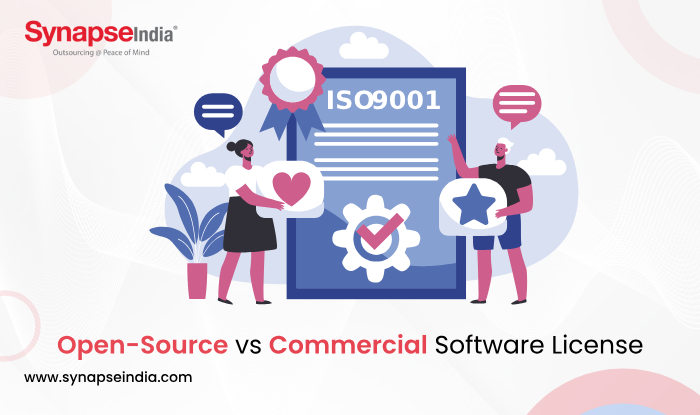 06 Mar 2024
06 Mar 2024“Open-source software is accompanied by licenses that grant users the right to view, modify, and distribute the source code freely. While commercial software is distributed under licenses that restrict access to the source code and often involve a fee for usage.”

Choosing a suitable software license is important when starting a new software project. The software project you opt for should protect your software and control the collaboration on software. Software license also ensures adherence to restrictions of third-party components in your software. The choice between Open Source vs. Commercial is difficult to make, however, with equivalent knowledge we can opt for the best one. Business owners might wonder which software licenses work best for their projects—being a critical component in the software industry, governing the terms and conditions in which software is being used, modified, and distributed. In this blog post, we will understand software licenses and the differences between open-source and commercial.
Software licenses are legal agreements that define how software can be used, distributed, and modified. They outline the terms and conditions under which users can utilize the software, providing guidelines for both developers and users. Understanding Open Source vs. Commercial is crucial for ensuring compliance and avoiding legal issues. There are various types of software licenses, each with its own set of rights and restrictions used for Software Development. Common types include:

Open-source licenses grant users the freedom to view, modify, and distribute the software's source code. There are different types of open-source licenses, such as the GNU General Public License (GPL), Apache License, and MIT License, each with its requirements and restrictions.
Commercial licenses are similar to proprietary ones but typically aimed at businesses or organizations. They may include additional features or support services in exchange for a fee.
Understanding the specific terms and conditions of a software license is essential for ensuring compliance and avoiding legal issues. It is important to carefully read and review the license agreement before using any software, and to seek legal advice if necessary.
Open Source vs. Commercial comparison highlights the key differences between open-source and commercial software licenses, including cost, source code availability, redistribution rights, support, updates, customization options, warranty, and licensing terms.
| Aspect | Open Source License | Commercial License |
|---|---|---|
| Cost | Typically free of charge | Requires payment or subscription fees |
| Source Code Availability | The source code is freely available and can be modified | The source code may or may not be available for viewing/modification |
| Redistribution | Allows redistribution and modification | Restrictions may apply on redistribution and modification |
| Support | Community-driven support | Typically includes vendor-provided support and maintenance |
| Updates | Community-driven updates and patches | Vendor-provided updates and patches |
| Customization | Users can customize the software to meet specific needs | Customization may be limited or require additional agreements |
| Warranty | Typically provided "as is" without warranty | May include warranties or guarantees |
| Licensing Terms | Governed by various open-source licenses (e.g., GPL, MIT, Apache) | Governed by proprietary license agreements |

Open source licenses allow users to distribute the software freely, either as-is or modified versions.
Users have access to the source code of the software, enabling them to study, modify, and enhance it according to their needs.
Users can modify the software to suit their requirements or integrate it with other projects.
Open source licenses typically do not discriminate against any person or group, ensuring equal access to the software.
Open source licenses do not impose restrictions on how the software is used, allowing for broad application across different domains.
Commercial licenses restrict access to the source code and typically do not provide users with the ability to view or modify it.
Commercial licenses often impose restrictions on the redistribution of the software, requiring users to obtain additional licenses for distribution rights.
Commercial licenses may impose usage restrictions, such as limitations on the number of installations or the types of environments in which the software can be deployed.
Commercial licenses typically require users to pay licensing fees in exchange for the right to use the software. These fees may vary depending on factors such as the number of users, features, and support levels.
Commercial licenses often include access to technical support services provided by the software vendor. This can include assistance with installation, troubleshooting, and software updates.
Understanding the distinction between Open Source vs. Commercial software licenses is crucial for businesses and developers alike. Open Source licenses offer transparency, flexibility, and community-driven innovation, making them ideal for collaborative projects and cost-effective solutions. On the other hand, commercial licenses provide proprietary features, technical support, and legal protections, catering to organizations that prioritize security, customization, and reliability. Whether opting for an open-source or commercial license, it is essential for users to thoroughly evaluate their requirements for Software Development. By understanding the business models developers can navigate the complex landscape of technology licensing more effectively and leverage software solutions to drive innovation and growth.


 17 Mar 2015
17 Mar 2015
